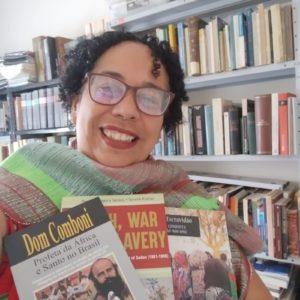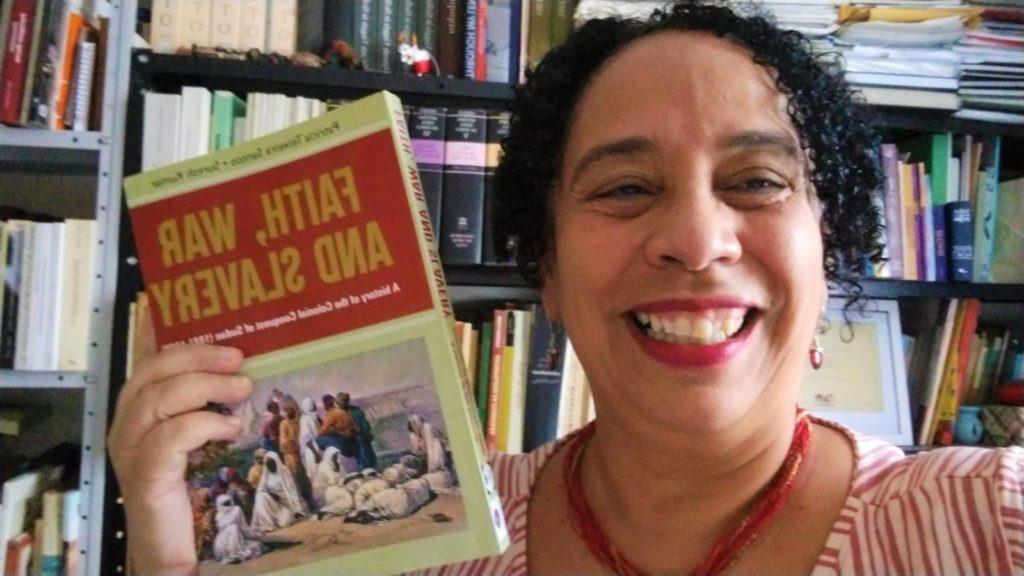
Rio-born scholar devotes career to tell history of Sudan
São Paulo – A career dedicated to the history of Sudan. That is the professional path taken by Patricia Teixeira Santos. Holding a PhD in History from Fluminense Federal University (UFF), she has researched and produced knowledge on the African Arab country since 1997. Now she is an associate professor of Africa History in the History Department of the Federal University of São Paulo (Unifesp) and a researcher affiliated with institutions based in Portugal, France and India.
Her studies encompass topics from contemporary history of Africa to anticolonial struggles in the continent.“Back when I started, we were far from talking about teaching the history of Africa in the university. But there was a desire from social movements and other sectors for us to start a dialogue not only with the past, related with the history of trafficking, but with contemporary studies to better understand anticolonial movements, the diversity of African societies, and African Islam,” Santos said in an interview with ANBA.
To get the documents she amassed, the professor had the collaboration of at least 60 people from four different countries.“I had to develop some skills and hone others for the research, as Sudan is a multicultural territory,” she said on her need to learn how to read in several languages.
Besides poring over works in English and French, Santos had the support of Arabic researchers and translators.“And I was only able to do that thanks to the public university, and I had the chance to pursue a PhD in an excellent institution with an advisor that was very aware of Arab issues,” she said.
Daniele Comboni
In her quest to blaze new trails, the scholar was advised in her master's degree by Daniel Aarão Reis, professor of Contemporary History at UFF. The first topic brought about in her research was missionary bishop Daniele Comboni, who lived and wrote letters on Sudan in the nineteenth century. The second part of the work delved into the expulsion of his followers from the Arab country.

The researcher has launched two books in Portuguese on Sudan. One has been translated into English
The so-called Comboni Missionaries migrated then to places like Brazil.“Many got closer to the Liberation Theology here, carrying out a ministerial care work focused on the situation of Brazilian black people. The congregation was born from colonialism and comes to America in the context of challenging it,” the professor says.
Her master's degree gave rise to the book Dom Comboni: Profeta da África e Santo no Brasil [Daniele Comboni: A Prophet in Africa and a Saint in Brazil], which has been published by publishing house Mauad. The text came to provide information on Sudan, addressing the lack of data on the country.“You cannot study Africa without studying the history of Sudan. It was different from everything around it. It was an English Egyptian condo, a space that dealt with several powers that build a tight administration supported by local elites,” Santos said.
Mahdist Revolt
In her PhD, the Rio-born scholar delved deeper into Sudanese history, studying the Mahdist Revolt.“We took a leap in this Sudanese context to the largest anticolonial revolution that took place there.“Understanding who Muslim leader Mahdi was and his role in bringing such different peoples by challenging the increasing French and English influence on the lives and destinies of the peoples,” she explains.
Tapping into different sources, the researcher sought out several documents produced during the Mahdist State.“This showed an extremely rich society, with typography and text circulation. In this part of the research, I also gained access to the letters of Mahdi in the University of Khartoum,” she explained on the institution of the Sudanese capital city she contacted during her studies.
The Revolt that ran from 1881 to 1898 fuels the narrative of her book Faith, War and Slavery: A History of the Colonial Conquest of Sudan.“We arrived at something unique – a rich dialogue with people from other spaces that participated in this revolution, particularly the participation of Indian traders,” she explained.
This last bit of information caught the attention of professor Suresh Kumar, director of the Department of African Studies at the University of New Delhi, India, who suggested the translation of the work into English.“I have to acknowledge the crucial role of Suresh Kumar in the publication of Faith, War and Slavery. I also dedicated this to all women in leading roles in history and their heiresses,” said the professor, who has taken her work to countries like Burkina Faso, Angola, Mozambique, South Africa, Italy, United Kingdom, France, and Portugal.“A professor once told me: You came all the way to Europe to find Sudan,” she reminisces.
What's next
Among her productions, two digital materials are about to come out. First is a new edition of the work developed in her master's degree, which is about to be published as an e-book by Unifesp's publishing house. Second is a collection of 20 years of documents and papers on Sudan that will be published by the publishing house of the University of Pernambuco (UPE). The launches are set to take place between December and March.
Translated by Guilherme Miranda
Personal Archive/Patricia Teixeira Santos Personal Archive/Patricia Teixeira SantosThe post Rio-born scholar devotes career to tell history of Sudan appeared first on Agência de Notícias Brasil-Árabe .
.jpg)
Legal Disclaimer:
MENAFN provides the
information “as is” without warranty of any kind. We do not accept
any responsibility or liability for the accuracy, content, images,
videos, licenses, completeness, legality, or reliability of the information
contained in this article. If you have any complaints or copyright
issues related to this article, kindly contact the provider above.


















Comments
No comment